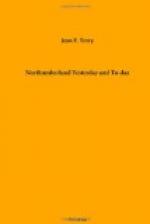Two years after this, a party of Scots under the next Douglas rode into Northumberland, coming nearly as far south as Newcastle. Hotspur set off from Bamburgh, of which castle he was Constable at the time, to intercept them. He awaited them on the banks of the Glen, near Wooler; and the archers of his force went out for forage meanwhile. When the Scots arrived, they found themselves in the presence of an enemy whom they had imagined to be behind them, and they immediately occupied Homildon Hill. The archers, returning, saw the Scottish force on the hill, and began the attack forthwith, letting fly their arrows upon the foe with deadly precision. Flight after flight fell upon the Scots, who were completely bewildered, and seemed incapable of action. A Scottish knight, Sir John Swinton, implored the leaders to charge, passionately exclaiming, “What madness has seized you, my brave countrymen, that you stand here like deer to be shot down? Follow me, those who will! We will either gain the victory, or die like men of courage.”
On hearing these brave words, Adam de Gordon, Swinton’s deadly foe, felt his hatred turn to admiration, and kneeling before Swinton, begged that he might receive the honour of knighthood from so valiant a hand. The two gallant knights then charged the enemy, followed by a number of the Scots; but the showers of arrows forced them to retreat towards the river, and thither also moved the whole Scottish force, followed still by that grim and deadly hail from the English bows. Hotspur would now have charged, but the Earl of March, his former antagonist, now his friend, restrained his impetuous leader, and persuaded him to let the archers continue their effective work.
The event proved his wisdom; the Scots were utterly routed by the archers alone. The unfortunate Archibald Douglas added another to his long list of reverses; he was taken prisoner, sorely wounded, as was also Sir Hugh Montgomery, and over four-score others of importance. It was in connection with these prisoners, whom Hotspur refused to deliver up to Bolingbroke, that the quarrel took place which eventually led Northumberland and his son Hotspur openly to throw off their allegiance to Henry Bolingbroke and join in the rebellion of Owen Glendower. Not only did Hotspur refuse to give up Douglas and the others to King Henry, but he wished Henry to ransom his brother-in-law Mortimer.
K. Henry. But sirrah, henceforth Let me not hear you speak of Mortimer. Send me your prisoners with the speediest means, Or you shall hear in such a kind from me As will displease you.—My lord Northumberland, We licence your departure with your son.— Send us your prisoners, or you’ll hear of it.
(Exeunt K. Henry, Blunt, and train)
Hotspur. And if the devil
come and roar for them
I will not send them:—I will
after, straight,
And tell him so.
* * * * *




